One year after receiving the devastating news that Harley-Davidson was discontinuing his namesake motorcycle brand, Erik Buell is back in business and working harder than ever to make his innovative motorcycle designs a reality. The 60-year-old iconoclast now heads Erik Buell Racing (EBR), housed in a small corner of the former factory on Buell Drive in East Troy, Wisconsin. There he converts existing 1125Rs into dedicated racing machines like the fearsome 1190RR that Harald Kitsch of Germany's Pegasus Racing used to dominate the 2010 European Twins/Sound of Thunder Championship, while at the same time laying the groundwork to re-enter the streetbike market with a new line of high-end, American-made sportbikes. Recently released from his non-compete contract with The Motor Company, Buell shared with us his opinion on Harley's decision to shutter Buell (at a staggering, $125 million cost), his struggles with management as that company's focus shifted to "core customers," and the fate of the radical B2 Barracuda prototype. Buell also revealed his future plans, including a return to volume motorcycle production and a possible collaboration with Bombardier under the Can-Am name.
Q: What were you told regarding Harley-Davidson's rationale for discontinuing Buell?
A: I was not privy to any management discussions. I was just told they were pulling the plug-period. I got hearsay from people who'd been in meetings where it was suggested that Buell was disrupting Harley-Davidson's ability to focus on its "core customers." I do know they surveyed the H-D dealer network, asking dealers if they thought they should keep Buell. Only 35 or 40 percent of H-D dealers even sold Buell in the first place, so it was pretty much a foregone conclusion that the majority would say "No, let's just focus on Harley." Beyond that, who knows? I'm not really in a position to say anything.
Q: What was Buell's financial performance in the year before the shutdown?
A: We were making in the region of 8000-10,000 bikes a year. I'm not allowed to talk about the financials, but the entire sportbike industry was in a bad situation in '09, Buell included. Our sales had dropped significantly. Buell was a little division of a great, big company that was doing 350,000 units a year, and it was in trouble, in a sector that was in trouble. So maybe it's not surprising that Harley decided to get out. From that perspective, it's not an irrational decision to close Buell. It's exactly the kind of decision that people with that background and those goals are used to making. They just did what executives do.
Q: What is the status of the Buell Motorcycle Company right now?
A: The Buell name remains with Harley-Davidson, as does the intellectual property and all of the original patents. That's the case when anybody leaves a company.
Q: Is it true that Bombardier approached Harley-Davidson to acquire the rights to produce and distribute the complete 1125R motorcycle?
A: I don't know what all the negotiations were; we were too busy trying to get Erik Buell Racing off the ground. There were people who thought the Buell name had value, but in the end, nothing happened. That's all water under the bridge.
Q: Given that Harley-Davidson retains the rights to all Buell intellectual property, how are you able to sell motorcycles under the Erik Buell Racing name?
A: One thing that I did get from them, which I think was a great move, was the ability to license and use the Buell name and sell derivative Buell racebikes until December 21, 2010. It was a good marketing move for them, because it kept the Buell brand alive and saved it from collapsing while they had a lot of inventory in the dealer network to sell off. Harley won't build any more Buells, but it still has to dispose of inventory and keep the value up in the short term. Allowing us to keep racing under the EBR flag was a very inexpensive way to help their dealers and keep good PR coming about Buell motorcycles. Right now we're at 10 full-time and two part-time employees, almost all from the old Buell group. We offer four basic models, ranging from $7500 track-day bikes to the $44,900 1190RR superbike. We won't be able to sell complete Buell motorcycles after 2010, but I can continue to supply parts because I have all the tooling needed to make the race parts. Someone can bring us an 1125R and we can build an RR from it.
Q: What is the status of your relationship with the Harley-Davidson Motor Company? A: The separation was reasonably amicable. I did have a contract that said I couldn't get back into the motorcycle industry until February 2011, but that's basically fallen by the wayside and I'm pretty much free to do my own thing now. Buell is finished and gone, and it's not like I'm going to compete with H-D, so why should they keep me out of the industry?
Q: What are your plans for the future?
A: I want to get back into the streetbike business, manufacturing innovative sportbikes. Only this time, I don't want to be restricted in what I deliver to the customer. If I have investors or enter into a partnership with another company-which I guess is inevitable-it'll have to be somebody who very much understands the sportbike market and the customers I want to address.
Q: How would that differ from last time? Do you feel Harley-Davidson management failed to give you the necessary support to build the bikes the market demanded?
A: Look at the B2 sportbike that was scheduled to debut in 2011. That would have finally brought to market a motorcycle I built as a prototype way back in 1988. That would've been 23 years between concept and production! Sure, it was a radical bike, but all the way Harley management resisted. "We don't want to do a hyperbike," they said. "We don't want to go head-to-head with the Japanese." The whole situation at H-D got pretty frustrating. I'd throw out concepts, but the bottom line was that they made the decisions as to what got built. I'm convinced we'd have been much more successful had we come out with a genuine superbike like the B2 years ago.
Q: Have you discussed working for Bombardier, possibly designing and building motorcycles under their Can-Am brand?
A: I can't talk about that specifically. But I will say it's a great company. Bombardier and its Rotax division are both very innovative companies.
Q: Has Erik Buell Racing had any discussions with Bombardier about using the Rotax 1125R engine in a future streetbike?
A: We've discussed buying engines from them in the future if we move ahead. I like the engine very much, and it's been great for us in terms of racing. It's extremely durable. You can put thousands of racing miles on them at Superbike level, and they still look like new. Rotax really knows how to build motors.
Q: What would a future Erik Buell streetbike look like? Should we expect to see the B2 under a different name?
A: I can't produce that exact motorcycle, because it's the property of Harley-Davidson. But just like Ducati has made 90-degree V-twins, and Honda has made 90-degree V-twins, I can make a bike similar to that but with my own flavor and my own new ideas. We're moving ahead with new designs that won't violate the Buell/Harley intellectual property. That is definitely one of the first bikes that we'll do. It's what we're working on right now, while looking for the financing to make it all happen.
Q: What do you need to make that vision a reality?
A: The key issue is finance. We're working on a financial plan. A private stock offering is probably what it'll end up being, with a small group of initial investors to get us through the first phase. We already have the space and skills to build the bike. I'm currently renting a 12,000 square-foot portion of the old factory-about 25 percent of it. We also have a skilled workforce in the area, and many haven't been re-employed. We have people available who know how to build sportbikes. Existing Buell distributors around the world are desperate for more products, as are dealers who were doing a wonderful job selling our products.
Q: If another manufacturer came to you and asked you to go work for them in the meantime, would you do that?
A: Possibly. If I found another company already in the business, and I thought the fit was really good, I'd certainly talk to them. I'd really want to make sure it was somewhere that I could do the innovative things I want to do.
Q: It's one year since Buell was shut down. How do you feel now?
A: I'm not bitter at all toward Harley-Davidson. I'm not devastated that my name can no longer be placed on bikes that I build. That's the way it goes. Look forward, not back. But I am very concerned about Buell's customers, the people who bought our bikes and are now maybe saying, "Did I make a mistake? Am I going to be able to keep riding this thing?" I want them to be supported. It's also very hard to get over the loss of jobs, which was a loss of hope for a lot of people. Many of our people have been re-employed doing different things, thank heavens, but they've still lost a job they really loved. I get calls all the time saying they'd love to come back.
Q: And you intend to give them that opportunity?
A: That's the plan. I've got more to do than just play guitar! There's a constant flow of ideas rushing through me. I know what motorcycles I want to build, I know they'll offer something nobody else has and I know I have people out there who want to buy them. Now I just have to make it happen-this time, on my own terms.










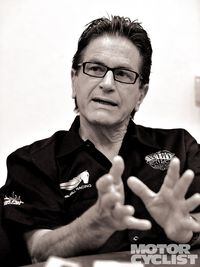
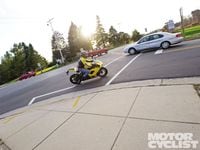
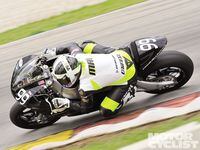
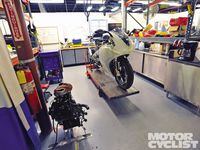
/cloudfront-us-east-1.images.arcpublishing.com/octane/GTCXACQGJ5HAPDTGWUQKDEH44E.jpg)
/cloudfront-us-east-1.images.arcpublishing.com/octane/S35YGSEMEZB4BLTDJTSZPF4GLA.jpg)
/cloudfront-us-east-1.images.arcpublishing.com/octane/5UOT6HPX2JFMRJAX6EH45AR4MQ.jpg)
/cloudfront-us-east-1.images.arcpublishing.com/octane/OKWOJWAKP5EP3OACCRRWPCIX2Q.jpg)
/cloudfront-us-east-1.images.arcpublishing.com/octane/2WF3SCE3NFBQXLDNJM7KMXA45E.jpg)
/cloudfront-us-east-1.images.arcpublishing.com/octane/G4MG6OUCJNBSHIS2MVVOTPX65E.jpg)
/cloudfront-us-east-1.images.arcpublishing.com/octane/IIGGWFOTOJGB7DB6DGBXCCMTDY.jpg)
/cloudfront-us-east-1.images.arcpublishing.com/octane/QSTCM6AVEZA5JJBUXNIQ3DSOF4.jpg)
/cloudfront-us-east-1.images.arcpublishing.com/octane/U4I7G625B5DMLF2DVIJDFZVV6M.jpg)
/cloudfront-us-east-1.images.arcpublishing.com/octane/B6XD6LS6IVCQPIU6HXDJSM3FHY.jpg)
/cloudfront-us-east-1.images.arcpublishing.com/octane/ICL63FEDDRDTTMINYICCEYGMDA.jpg)
/cloudfront-us-east-1.images.arcpublishing.com/octane/FCGZHQXRBZFLBAPC5SDIQLVF4I.jpg)
/cloudfront-us-east-1.images.arcpublishing.com/octane/WNOB6LDOIFFHJKPSVIWDYUGOPM.jpg)
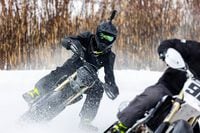
/cloudfront-us-east-1.images.arcpublishing.com/octane/X33NU3E525ECRHXLNUJN2FTRKI.jpg)
/cloudfront-us-east-1.images.arcpublishing.com/octane/6KKT5NNL2JAVBOXMZYS5ZO76YA.jpg)
/cloudfront-us-east-1.images.arcpublishing.com/octane/J5RKG5O455GMPGQRF2OG6LRT7A.jpg)
/cloudfront-us-east-1.images.arcpublishing.com/octane/GX2CIZKQVRH2TATDM26KFG2DAE.jpg)
/cloudfront-us-east-1.images.arcpublishing.com/octane/ZWIDYSAKQZHD5BHREMQILXJCGM.jpg)
/cloudfront-us-east-1.images.arcpublishing.com/octane/CYUHJZCTSJCH3MRAQEIKXK7SCQ.jpg)
/cloudfront-us-east-1.images.arcpublishing.com/octane/LKOFINY56FCXJCANJ5M7ZDQUBY.jpg)
/cloudfront-us-east-1.images.arcpublishing.com/octane/4NBPDACMWJH63JQYJVK3QRBDZI.jpg)
/cloudfront-us-east-1.images.arcpublishing.com/octane/KKHQHRR3FJGX7H2IPU6RALMWG4.jpg)
